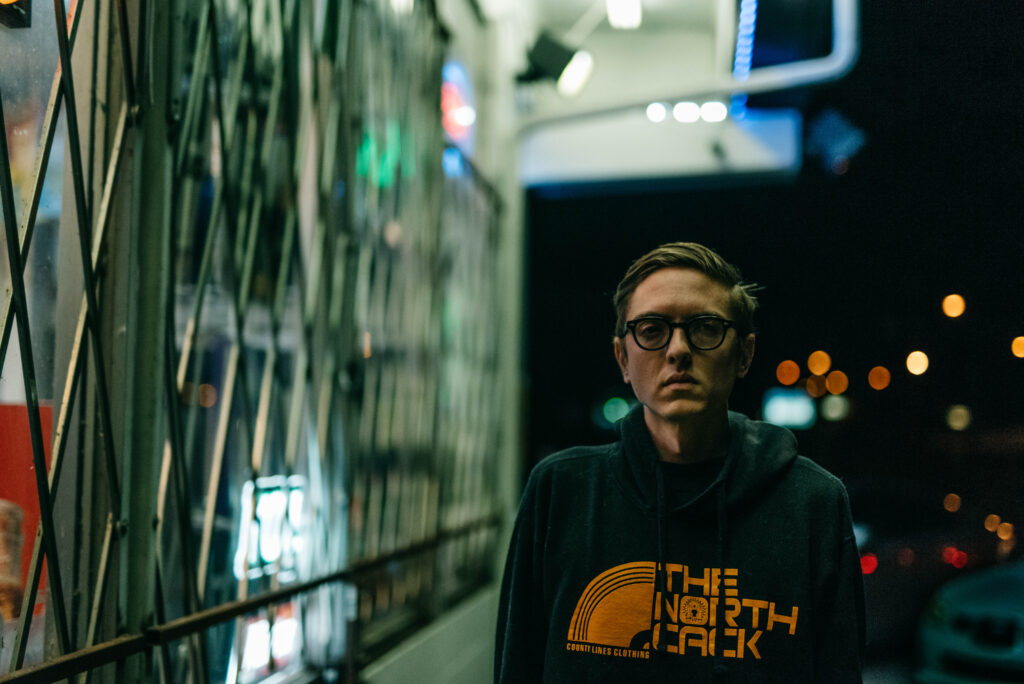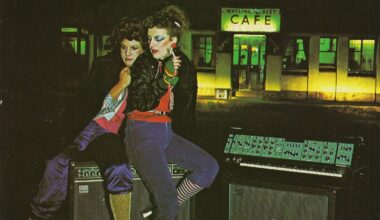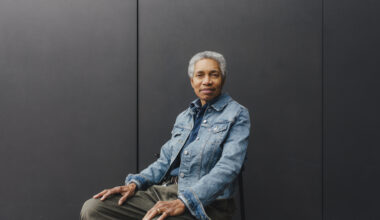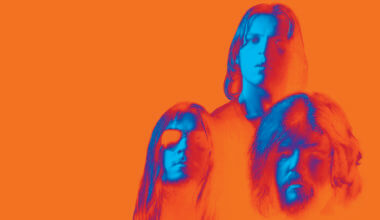He’s deaf in one ear, makes beat-heavy music from unpromising raw material – including pre-war jazz and old radio shows – and yet Seattle’s L’Orange will change everything you think you know about hip hop…
His most recent record may be called ‘The Ordinary Man’, but L’Orange is anything but. The North Carolina-raised, Seattle resident has, without necessarily even trying, managed to reconfigure conventional thinking on how sample-based songcraft can work.
Over the course of six years and seven (soon to be eight) LPs, he has crafted a signature style that has given 21st century hip hop arguably its first truly distinctive new production voice. At the heart of his electronically-made music is an unmistakably human heartbeat, courtesy of a crate-digging process that has seen him turn – frequently, though not exclusively – to jazz records made in the pre-stereo era.
There is no easy get-out for a beatmaker when the original record isn’t in a time signature with two or four beats to the bar. When L’Orange loops a sample, the effect rarely fits preconceived notions of sonic shape: the new musical figure he creates can feel off-balance, and it means his singular productions are always slightly out of step with what everyone else is doing.
“Jazz, especially early 20th-century jazz, is such a difficult genre to turn into hip hop,” he says. “These are songs that were not necessarily recorded to a metronome; often they were just done in one take.
“That exact thing is what drew me to the genre early on, the idea that the music is sort of beautifully imperfect, and therefore very human. If it’s played perfectly, it’s because it was played perfectly in that moment. That creates a situation where the humanity of the music hasn’t been refined out. It’s not only pleasing: it’s wobbly, and at times off-key.”
Since the late 1990s, when hip hop first became America’s dominant commercial genre, the music has diverged. The sample-heavy patchwork approach taken by “golden age” classics like De La Soul’s ‘3 Feet High And Rising’, the Jungle Brothers’ ‘Done By The Forces Of Nature’ or the Beastie Boys’ ‘Paul’s Boutique’ gave way to simpler, more accessible tracks based around single recognisable samples, if samples were involved at all. More recently, as digital distribution has acted against sonic diversity and pop’s mainstream has homogenised, sample-based hip hop production has come to feel almost like a deliberate homage to this magpie music’s experimental roots. For too many artists, sampling in the 2010s feels more like a deliberate signifier of supposed authenticity rather than a creative musical choice.
Yet as much as L’Orange’s tracks recall earlier eras, his approach succeeds in achieving the kind of timelessness few of his contemporaries can match. Those early jazz samples may evoke the 1940s or 50s, but the vocalists whose words are woven inside and around the music are very much of their moment.
Meanwhile, the taut snares and expansive mid-range melodic elements (snatches of piano or brass that blow like desert winds across his unusually wide stereo soundstages) recall the snarl and snap of early 90s classics from the likes of RZA or DJ Premier.
That expansive stereoscopy has been achieved despite the recent worsening of partial deafness that L’Orange had suffered since childhood. A benign tumour necessitated three surgeries in recent years, and he has now lost almost all hearing in his right ear.
“For about a year and a half it really hurt to listen to music,” he says. “I have roughly five per cent hearing in my right ear. So if I’m making a song or checking a mix, if I put on headphones and turn it up far too loud, I can get a glimpse.”
He had worked with the engineer Seiji Inouye before his operations, and that partnership has become vital.
“My relationship with him pre-dates my relationship with him as an engineer,” says L’Orange, “so I can speak a lot more candidly. I have to learn his equipment because mixing has gone from a sort of mechanical and emotional process to a very tactile and intellectual one, even cerebral, maybe.”
There is another way L’Orange’s music is distanced from pretty much everyone else’s: he chooses to work primarily in the LP format, and each release has a coherent storyline running through it. These are very much bodies of work conceived to be heard full-length in a single sitting, ideally from a vinyl copy – his albums usually have very clear breaks at the end of side one. It helps, too, that they are also released by the excellent Arizona-based independent label Mello Music Group on beautiful multi-coloured vinyl pressings that will surely see them being rediscovered by future generations much in the same manner that L’Orange has found their component parts.
Other producers may build sonic worlds, but L’Orange is probably the only one who populates those worlds with fully-drawn characters, and then uses his music to tell their stories. As he explains, every project begins not with demos or sonic ideas, but a narrative he writes down in advance, sometimes as a poem.

As well as the lived-in patina lent to his tracks by vintage jazz, the other element that’s become a key part of his sound is the inclusion of dialogue taken from radio plays. These spoken word snatches act as both atmospheric and thematic cues, dragging the listener not just deeper into the distinctive soundworld he creates, but pulling them through each LP’s dramatic arc.
“I go to as many record stores as I can,” he says, “and I try to establish relationships with them. If something comes in, like an old radio show that they haven’t seen before they might end up passing on that normally, but if they know I’m there, they know I’m gonna show up the same day and grab it.
“I keep a very large collection of old radio shows, and I comb over them,” he says, “trying to find pieces that can express the story that I want. It’s often an imperfect process. There’s no single radio show that tells my story. I have to use symbols, and I have to know privately when the narrator is talking versus when the characters are talking. I try to put tense and pronouns and gender of the person talking to the side, and I try to do it as sort of an automatic narrative. I know the listener is never going to get all the details that I’m trying to put in, but my hope is that, by doing that, I establish a deep story that will imbue the essence and the emotion of that part of the story.”
This necessitates a way of interacting with vocalists that goes beyond 21st century norms. Since the late 1990s, conventional wisdom has suggested that the MC is the star, soliciting music from a number of producers best equipped to supply the range of beats necessary to compete in the marketplace. The resulting releases tend to rely on the rapper to supply whatever thematic or sonic cohesion they have. With L’Orange’s LPs, he sets the ground rules.
Whether he’s collaborating over the full length of an album with an MC as he has done with the celebrated likes of Kool Keith (the 2015 time-travel concept album ‘Time? Astonishing!’) or Mr Lif (2016’s tale of dystopian revolution, ‘The Life And Death Of Scenery’) or working with a selection of different vocalists each contributing to no more than a single song in a longer cycle (as on his three solo albums ‘The Mad Writer’, ‘The Orchid Days’ and ‘The Ordinary Man’), the working relationship is as distinctive as the ensuing tracks.
To the outsider, it seems less like the relationship that normally exists between a producer and a vocalist, and more that of a film director with a cast of actors who are given the outline of the plot, but encouraged to improvise the dialogue.
“During ‘The City Under The City’ [L’Orange’s first full-length collaboration with a single MC, Kansas native Stik Figa] was when I really solidified what I think the process should be for me,” he says. “Instead of telling each vocalist the story I have in mind, I tell them the emotional beats of my story. I try to express these as abstractly as possible, without giving any details, because, as I’ve got older and as I’ve worked more often in music, I’ve found that it’s not my job to control what the artists around me do, it’s my job to position artists that I trust around me.”
He admits that the directions he gives can sometimes appear so vague as to be almost opaque. His suggestions to Jeremiah Jae for 2015’s masterful ‘The Night Took Us In Like Family’ included for one lyric “to sound like you’re downtown, it’s been raining all day but it just stopped, there’s fog settling in, and you can see the lights of a bar a block away”.
Yet there is method in this apparent madness, and the resulting collaboration has the listener reaching for far-flung points of reference. ‘The Night Took Us In Like Family’ is definably and definitely a hip hop record, but its tale of revenge in a criminal underworld puts it in the tradition of noir authors such as Raymond Chandler and James Ellroy, while ripples of distant piano and disembodied voices echoing through the spaces in the mix suggest that the paintings of Edward Hopper are also apt touchstones.
In many respects, ‘The Ordinary Man’ takes these unique or unusual aspects and dials them all up. Its storyline concerns a stage conjurer whose audience keeps asking how the tricks are performed, and who, in the end, rebels against their demands. What sounds, musically, like a distant relative of De La Soul or DJ Shadow ends up even more strongly recalling ‘The Clown’, Charles Mingus’ acerbic take on the torture talent can inflict on those bestowed with it, and ‘The Prestige’, Christopher Nolan’s 2006 film of illusion, illusionists and deadly creative competition.
Better still: rather than restricting the vocalists’ contributions, the narrative direction ends up providing the rappers with a broader canvas on which to show their skills. In ‘The Difference’, Elzhi and Blu propel the story forward by showing the distance the magician has put between himself and his contemporaries, but the song allows both MCs to indulge in some dazzling one-upmanship of their own. Fellow Mello Music signee Oddisee’s dextrous, bravura verses on ‘Look Around’ work as both the magician’s despair as the public fail to understand what he’s doing, and the rapper’s own thoughts about life on the road in front of audiences who may only distantly, if at all, grasp what it takes to get up on stage and perform.
There’s a deliberate aim at something bigger, too. Anyone hearing connections between the different albums and their storylines isn’t imagining things. His latest project, an album with ‘The Ordinary Man’ collaborator Solemn Brigham to be released this month under the group name Marlowe, melds raps about being an underground artist into the radio-play-assisted tale of an inhabitant of a lost subterranean land. L’Orange says the project marks a return to the location of the story told on ‘The City Under The City’, while a skit in which Brigham tries to persuade passers-by to come into a dismal carnival sideshow links the record tightly to the down-at-heel big-top environment of ‘The Ordinary Man’. It’s as if he is not just building a series of sonic worlds, but a shared universe they all inhabit.
So while it is fairly clear where L’Orange wants to take the listener narratively, there’s a lot of room left for individuals to draw their own conclusions. That openness to reinterpretation is an obvious strength, but only, he argues, if the leeway is given to the listener within certain constraints.
“I think a lot of the time, artists fall into this trap of saying, ‘It means whatever the listener wants it to’, ” he says. “It’s sort of a cop out to do that, to say, ‘I’m not willing to own my message, what I’m willing to own is my work, my music’. They can then say, ‘It’s now the audience’s responsibility to tell you what I am’.
“And so, the distinction that I try to create there is, I know what I am… but the listener’s not wrong either. The story, in my mind, goes very clearly in one direction, but I am positive there are people who’ve realised there’s a story and have tried to piece it together, and have their own sort of mosaic of how they view it – and they’re absolutely correct also.”
‘The Ordinary Man’ is out on Mello Music Group






